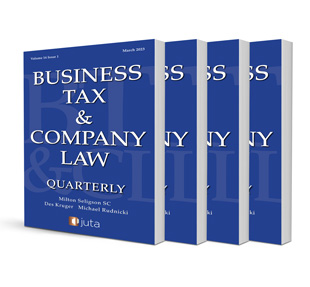Abstract
The judgment in Maqubela v The Master leaves room to revisit some established norms in private law that define under what circumstances a subject may be disqualified and found to be unworthy to benefit financially from his/her behaviour against another – including the deceased. The deceased Maqubela AJ took out a significant life policy (R20 million) on his own life two weeks before his death. At the time of his death he was still married in community of property to his wife but was seriously contemplating divorce. His wife was not only aware of the significant life insurance that had just been taken out, but also of his contemplation of divorce. She was much annoyed about his multiple adulterous affairs over many years and even mentioned as much to the minister of justice the day before his sudden death in a deliberate way so as to discredit him in the eyes of the minister.
After the sudden demise of the insured life under suspicious circumstances, the widow was originally found guilty of premeditated murder of her husband and of the fraudulent production of a document presented to the master of the high court as the last will of the deceased that was proven to be a falsification in every respect. For the second offence she was sentenced by the court of first instance to prison for three years. On appeal the supreme court of appeal upheld her appeal regarding the conviction on the murder charge, but the other conviction remained intact.
In the civil case under discussion the court had to decide whether the widow as claimant was entitled to half of the common estate with inclusion of the R20 million insurance benefit as well as to lay claim as beneficiary under the norms of intestate succession to the widow’s part of the deceased’s estate.
It is submitted that the well-known “bloedige hand” rule, which excludes the person responsible for the death of the deceased from benefiting under the law of succession from the estate of the deceased, is merely an example of the underlying broader principle encapsulated in the text from Roman law “nemo ex suo delicto meliorem suam condicionem facere potest” (D 50 17 134 1): “No one is allowed to improve his own condition by his own wrongdoing” or “no woman should profit from her own wrong”. This principle can be found not merely in every civil law legal system but is also recognized in all common-law jurisdictions as can be deduced inter alia from the judgment in Karen L Postlewait v Ohio Valley Medical Center, Inc, a Corporation, et al, and Ohio Valley Medical Center, Inc, a Corporation, and The Estate of Robert L Postlewait, where Maynard JA on 8 Dec 2003 in the appeal to the supreme court of appeal of West Virginia held: “However, the majority equally fails to consider the possibility that Mrs Postlewait’s misconduct in pushing her husband off the porch played a significant role in her husband’s death. Clearly, the chain of events that led to Mr Postlewait’s death were directly put in motion by Mrs Postlewait. Mrs Postlewait filed a medical malpractice/wrongful death action against her husband’s medical providers and successfully negotiated a settlement netting herself more than half a million dollars! Given these circumstances, I am unable to find that Mrs Postlewait is entitled to profit from her husband’s death. Accordingly, I respectfully dissent” (31406). Clearly the claim of Mrs Postlewait to the resulting benefit of more than half a million dollars was unrelated to any claim founded on the law of succession. The quoted Latin maxim is a venerable old maxim in equity and should have been at the root of the judgment in the Maqubela case where there is room to suspect that the old adage still applies: the love of money is the root of all evil.
In light of the proven circumstances surrounding the demise of the late acting judge and the fraudulent attempt by his widow Maqubela to pass herself off as the primary testamentary beneficiary of his estate, reasonableness and equity prescribed that the erstwhile wife may neither lay claim to the significantly enhanced half of the common estate thanks to the life insurance benefit nor claim a child’s share as the widow’s portion of the estate of the deceased as governed by the law of intestate succession. Her conduct regarding the proven crime of the falsification of the will should have excluded her as unworthy beneficiary from any form of financial benefit from her marriage to the deceased including the claim to half of the common estate.
Matthaeus, the most prominent Old Authority on the implications of this principle in Roman-Dutch law, clearly states in Zinspreuken 6:4 that the disqualified unworthy spouse is also excluded from benefitting from the enhanced half of the common estate under the guise of the default principle of a rightful holder of half of the common estate. Modern Dutch law applies the same underlying principle to prevent unjustified enrichment of the wrongdoer. The principle of legal certainty in South African law did not benefit by this judgment. Not merely does it ignore the standing principles of Roman-Dutch law, but it also compares unfavourably with the outcome in related scenarios in comparable other legal systems.


